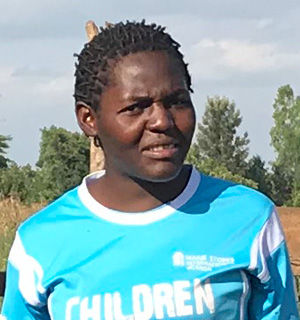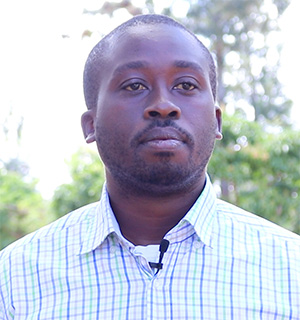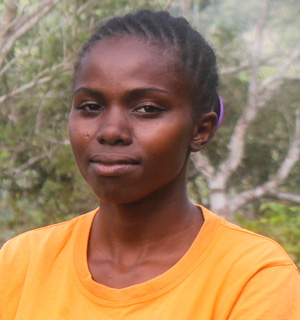Creating opportunities for youth
Alongside other development partners and agencies, icipe recognises the urgent need to enhance productive employment for the youth, as a fundamental component for Africa’s socio-economic transformation, in alignment with the African Union (AU) Agenda 2063 and the aspirations of the United Nations Sustainable Development Agenda (SDGs).
Below, we feature five inspiring stories of young people from Ethiopia, Kenya and Uganda, who have found enriching opportunities through the Centre’s activities.
Peace Nakato
Age: 24 years, Uganda
Programme: Push-Pull integrated pest management technology
I was born and raised in Bugiri town, eastern Uganda. My parents were business people. I can describe myself as the ultimate daddy’s girl. Growing up, I watched my father rear various domestic animals and I aspired to be just like him. After school, I would graze our cows around the neighbourhood for at least an hour, and thoroughly enjoyed the exercise. On graduating from high school, I trained to be a teacher, ultimately gaining employment in a primary school in our town. Although I enjoy this profession very much, farming remained a key passion. In particular, I was very keen to raise pigs. Coincidentally, my family had a piece of land that was on the verge of being abandoned due to Striga investation. In 2015, my father heard about icipe and the Centre’s ongoing trainings on Push-Pull technology in Tororo, a neighbouring town. He contacted the researchers and managed to get us enrolled into the sessions. Initially, the benefits of the technology sounded too good to be true, and we were sceptical. However, we were persuaded to adopt the technology by the possibility of obtaining high quality fodder, which would enable us commence pig rearing. To our pleasant surprise, during the first season, we noted drastic reduction of Striga infestation. Moreover, our plot was not affected by the coinciding outbreak of fall armyworm. I am now an established Push-Pull farmer, and in addition to good maize harvests, I have healthy pigs, dairy cows, and goats.
Joseph Wambua Muendo
Age 31 years
Machakos County, eastern Kenya
Programme: Fruit Fly integrated pest management
I was born in Nairobi, Kenya’s capital. During the school holidays my father would send us to our rural home in Machakos county, apparently to spend time with our relatives. Thinking back, I believe he was slowly initiating us into an alternative path for our future, building in us the courage to explore options beyond the hustle and bustle of the city. I graduated from high school in 2000, amidst the hype that marked the turn of the millennium. Caught up in the excitement, and due to my personal interest in computer programming, I enrolled for a course in a Information Technology. But, by the time I completed the course, the market was flooded with similar graduates, and although I secured a job, it did not come with the satisfaction I had anticipated. Meanwhile, my father was having problems managing a piece of land he owned in Machakos County. I decided to take the property over, believing that I could make the land more productive and economically viable. The first thing I did was to streamline mango farming, for example by rationalising the tree population. But I faced one daunting challenge: fruit flies. Every season I would be faced with the gruelling task of hand spraying the pests, spending up to 20,000 shillings, but all in vain. For example, due to this menace, our profits declined from an all time high of Kshs 300,o00 down to a low of Kshs 50,000. In 2017, I heard about the icipe fruit fly management strategies from a friend. I was fortunate to connect with to ADS, who provided me with traps. Although we started using the traps too late in the season, we still noted a decline in fruit fly populations. Now we are using them for the second season, and are hopeful of better yield. I anticipate to improve my yield. and with increasing earnings invest in real estate and other emerging opportunities. I will be able to connect my urban and rural experiences.
Samuel chan
Nyabondo plateau, Kisumu County, western Kenya
Age 34
Chairman, Mosquito Control in Nyabondo (MOCON)
Integrated cector control in malaria programme
As the fourth child, out of seven born to peasant farmers, I did not have an easy childhood. I largely relied on my older brother, a temporary worker in Nairobi, for school fees. My ambition was to be a teacher, but due to financial constraints, I attended school far too irregularly to attain qualifying grades for college. I completed high school in 2004 and for the next seven years I somewhat resigned myself to a live of hustling.
In 2011, an advertisement at the chief’s office caught my attention. icipe was seeking ‘O’ level graduates to be employed as “self scouts” for various integrated vector management (IVM) of mosquitoes activities being implemented by the Centre. I interviewed for the positions, and was thrilled to be selected.
Like many people in my area, I was familiar with malaria and its dreadful impact. Growing up, every so often a family member would be down with the disease, depleting our already meagre resources.
The training icipe provided to the self scouts opened my eyes to the root cause of malaria. For example, we learnt how activities such as brick making, a major source of livelihood in Nyabondo, contributes to mosquito breeding, and thereby malaria. We were also trained on larval sampling and larviciding, and reclamation of such breeding sites. In addition, we were equipped with skills to conduct door-to-door education, give health talks in schools, while also helping communities in environmental management, and increased proper use of long-lasting insecticidal nets.
In 2013, the self scouts merged with two youth groups in Nyabondo to form a community based organisation (CBO) known as Mosquito Control in Nyabondo (MOCON), which became a partner of icipe. I was appointed the Chairman of MOCON. Together, we have been conducting a range of activities, including mobilising, educating and empowering the Nyabondo community in the control of mosquitoes and malaria using innovative ideas like sports.
Using part of the resources we receive from icipe, the MOCON members were able to purchase a piece of land and construct a temporary office in Nyabondo. We also set up a small restaurant largely targeting brick makers and other patrons. As they lunch, we provide them with IVM information and brochures of other icipe activities.
MOCON has become a platform that brings youth together, to empower each other. The CBO has maintained a core group of active people. Personally, I appreciate the impact of icipe on my life. I feel greatly enlightened, and I have developed communication as well as leadership skills. I have good networks in the community, and with policymakers. I have also been able to improve my own livelihood. Many of the other young people involved in MOCON can attest to this fact. Several of them have been inspired to advance their education, often returning to MOCON on internships. Our dream is to continue seeking support to make MOCON a sustainable organisation, a community hub county, and a gateway, not just for malaria eradication, but for development as well.
Cynthia Mbula David
Age: 22 years
Shimba Hills, Kwale County, Coastal Kenya
Integrated Vector Management of tsetse and trypanosomiasis
Shimba Hills, where I was born and raised, is a lovely area, green, lush and suitable for cattle rearing and the cultivation of many crops. But we face a major challenge due to tsetse. For example, in my lifetime, my family has lost no less than five cows to tsetse related diseases. In addition, I remember many times when we would simply give up farm work due to constant tsetse bites.
I grew up in what I can describe as an average family. As the youngest of my seven siblings, I was ambitious and thought I could outdo my siblings. My desire was to be a nurse. However, because of lack of school fees I often missed school, and when I sat O levels in 2016, I did not qualify for a nursing course.
I was most fortunate that icipe was in the process of enhancing relationships with the Shimba Hills community in regard to tsetse control. After many years of field trials of the technologies like the tsetse repellent collars and odour-baited traps, the Centre was working closely with the community of Kubo South to establish community resource persons (CORPs), who could take over the implementation of these tools. CORPs were selected on the basis of having demonstrated resourcefulness in the past in the monitoring and control of tsetse flies using traps and targets. At just 20 years old, I was selected on the recommendation of community members and for demonstrating potential to undertake the necessary duties effectively.
Being a CORP a great opportunity for me. Our role is to visit different parts of the region to monitor tsetse populations. We have received training on: collecting and managing insect samples from the field; using Garmin global positioning system (GPS) units to locate and mark positions of odour-baited traps, and utilising android mobile data collection devices with open data kits.
Though challenging, I believe I have been able to conduct the tasks assigned to me effectively. I am glad to be able to contribute to tsetse control and to improving to the lives of my community. I am glad that I am visible and appreciated in society. My confidence has gone up, and I am beginning to see all possible options for me for the future. I could train as a veterinarian, or even opt for a career in teaching…
Wudie Aymero
Age 26 years old
Amhara region, Ethiopia
Project: Young Entrepreneurs in Silk and Honey (YESH) project, a partnership between icipe and the Mastercard Foundation.
https://mastercardfdn.org/young-women-trailblazing-in-ethiopias-honey-economy/




